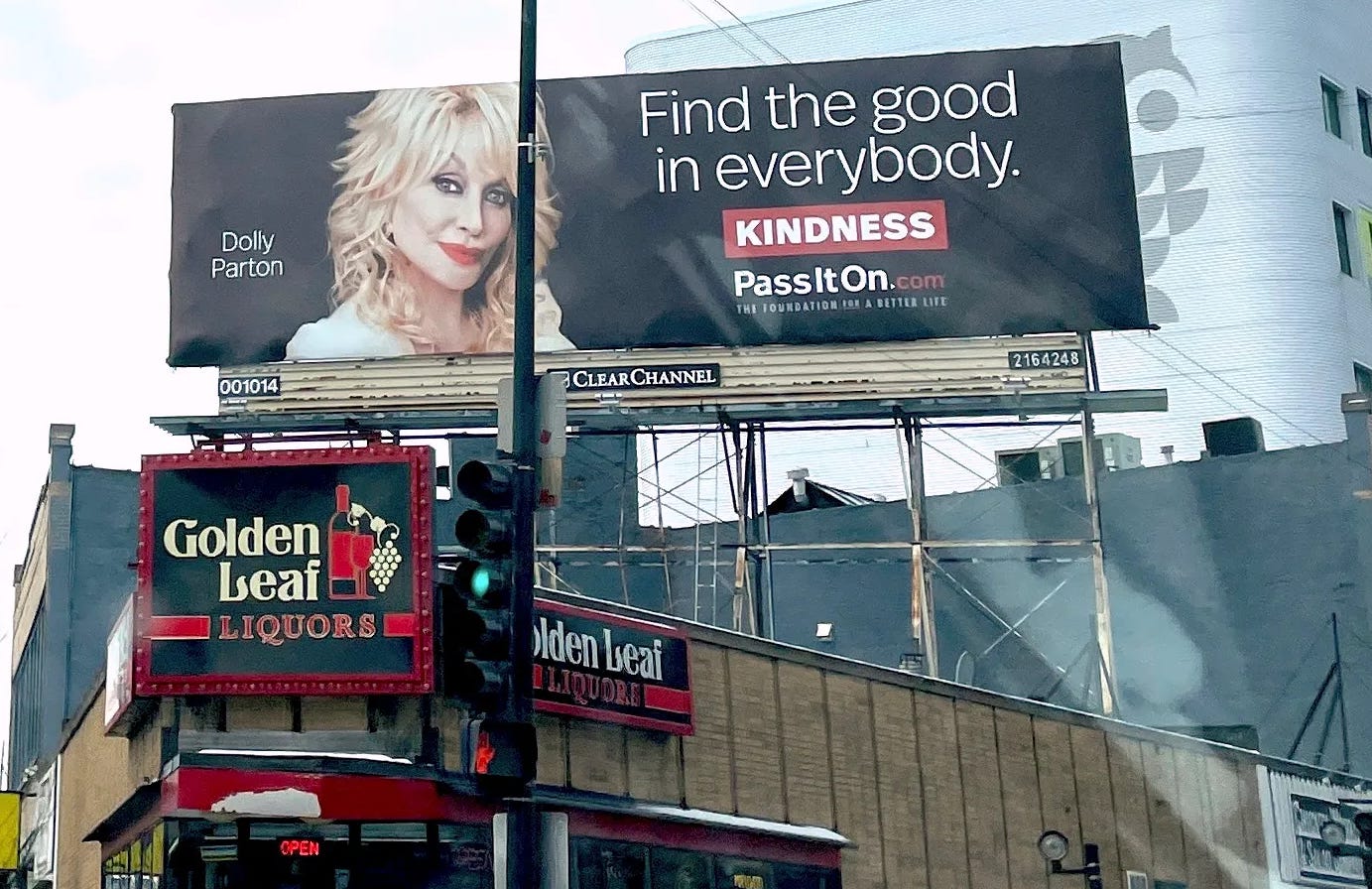A Dolly Parton cover, drama on Lolita Twitter, and scammy texts
Andy Mills and Matt Boll share their top Substack posts
This week’s edition of Substack Reads was curated by Andy Mills and Matt Boll, who co-host Reflector, a documentary-style podcast. Reflector merges meticulous reporting with compelling storytelling to illuminate urgent issues, focusing on stories that celebrate moral complexity and nuance. Andy and Matt have previously created and produced shows including The Daily (New York Times), The Witch Trials of J.K. Rowling (The Free Press), Crimetown, Radiolab, Rabbit Hole, and others, and have worked at the New York Times, Spotify, and NPR. Some of their most popular recent episodes include “No, You Stole the Election!,” “You Can’t Say That,” and “Hindsight: Stagger Lee & Killer Mike.” If you enjoy their edit today, be sure to subscribe to Reflector.
Hello, Substack Reads. This week, we two audio nerds have commandeered the ship and are steering you into what we’ll call “Substack Listens.” Each of our recommendations is someone we first discovered thanks to their music or podcasts, and several feature short audio clips. We hope to introduce you to someone in the Substack universe who brings you delight, who provokes you to think, and who you’ll be grateful to know.

MUSIC
Matt Boll: For the past 20 years, I have listened to Jeff Tweedy’s songs across projects, from Uncle Tupelo to Wilco, Loose Fur, and all his solo albums. As a young songwriter and musician, I would drive for hours, playing his songs on repeat, trying to dissect what he was doing musically and lyrically that felt so authentic. His Substack, Starship Casual, offers the most raw version of his songwriting I’ve encountered. The name is fitting—he’s casual and laid-back as he sings and plays songs from his extensive catalog. It’s like being a fly on the wall while Tweedy plays in his living room, enjoying the songs he loves. One of my favorite tracks he’s recorded in this way is “I Will Always Love You,” a cover of the classic Dolly Parton song.
I will always love you (Dolly Parton cover)
—
inCULTURE
Andy Mills: When historians look back on this past decade, they will marvel at how this silly thing called “social media” had such a massive effect on everything from our politics to how we shape our deepest-held beliefs. Who would have thought Tom from Myspace would change the world?
I think journalists Katie Herzog and Jesse Singal, as self-deprecating as they can be, will go down as this era’s most honest (and hilarious) chroniclers of the social media age. I cannot recommend their podcast, Blocked and Reported, enough. At their best, they are able to look deeply at the insatiable internet dramas of our time and—like Walt Whitman with his leaves of grass—see the universe (or at least see human nature with its pants down).
The episode I want to share today is an older one, but it captures my favorite quality of their show well. In it, they introduce a tiny subculture that I’d never heard of (Lolitas?) and then tell a story of “reckoning” that embodies the issues that have rocked society in the past few years.
Jesse goes on Rogan, a racial Nichols incident, and drama on Lolita Twitter
—
and inTECHNOLOGY
Matt: I worked with PJ Vogt, the host of Search Engine, in the early Gimlet days when he was making a show called Reply All. PJ is a gift to the podcast medium. He’s a great writer and interviewer. He’s funny but also sincere and, above all, curious. Search Engine is his current podcast, where he seeks to answer a question in each episode: “No question too big, no question too small.” Much like PJ’s previous work, this seemingly simple idea opens listeners up to the little worlds that exist around them, often unnoticed.
In the episode “Who’s behind these scammy text messages,” he explores the weird texts we get from unknown numbers, the ones saying something like “Hi, do you remember me?” The investigation reveals an unexpected world of human trafficking, scam compounds in Cambodia, and the famous YouTubers who attempt to set trafficked scammers free.
In this clip, reporter Zeke Faux tells PJ the story of Thuy, someone who escaped one of these compounds by using an iPhone in a very uncomfortable way.
Who’s behind these scammy text messages we’ve all been getting?
—
inPOLITICS
Andy: I think that Mike Pesca is the most underrated columnist in America. He regularly ends his daily podcast The Gist with what he calls “the spiel,” where he tells a story and gives his two cents about the world with clarity, political independence, and the sort of provocation that challenges the assumptions of even the most ardent news consumer.
In this post from June, he wrestles with the power that the media has (and does not wield responsibly) to redefine words and phrases. It’s a reminder of the importance of context and a plea for those of us in this business to take it seriously.
Intifada revolution, and the attempt to sow linguistic confusion
—
inHere’s an audio clip of Mike’s spiel from The Gist:
And you can read the entire spiel on his Substack:
Words are supple instruments. They can change meaning depending on the context, the time frame, or as they migrate from one language to another. The ambiguity of words is often a strength, rendering them malleable tools.
Take “intifada.” A mainstay of protests in and outside the Muslim world, it is a call to rise up. But what form should the uprising take?
LITERATURE
Andy: There are few journalists I adore more than Jon Ronson. Whether in his books—like The Psychopath Test, The Men Who Stare at Goats, Them, and So You’ve Been Publicly Shamed—or in his podcast Things Fell Apart, he embodies the curious spirit of our trade at its finest. His quote “If you fill your head with judgment, there’s no room for curiosity” is the mantra of our show Reflector. He’s also a master craftsman of story—not just in his screenplays for films like Okja and Frank but also in his work as a reporter.
If you’re not already a fan, I’m almost jealous, because you are about to discover one of our generation’s most exceptional voices.
Ronson recently launched a Substack, where he shares the wisdom he’s accumulated in a long career of truly remarkable work.
How to find your theme, the world you want to write about
—
inMy friend the documentary maker Adam Curtis told me many years ago that some writers (he meant specifically me) don’t have the brains to, say, sit in the British Library and think big thoughts about how the world works. I’m not a philosopher—he was saying—nor a polemicist, nor a social scientist, nor whatever. I’m a journalist. And what do journalists do? We go out and find stories. We walk the streets like gumshoes.
“Just keep doing stories,” Adam told me, “and maybe some theme will emerge, something that might turn into something bigger.”
Adam was right. It was exactly how I ended up writing my first book, Them.
Recently launched
Noteworthy
Inspired by the writers featured in Substack Reads? Creating your own Substack is just a few clicks away:
Substack Reads is a weekly roundup of writing, ideas, art, and audio from the world of Substack. Posts are recommended by staff and readers, and curated by Substack’s editors. This week’s edition was guest-edited by and , who co-host the podcast .
Got a Substack post to recommend? Tell us about it in the comments.

























Substack Reads is becoming a parody of itself - ditching discovery to feature Substack publications that are already wildly successful. Having someone of the prestige of Jeff Tweedy on Substack surely benefits all other music scribes here (myself included) but surely this week's hosts of this space could have dug even a little more deeper to feature someone who is doing good work on the caliber of Mr. Tweedy and who deserves the exposure.
I would've loved to see Ben Wakeman's fiction podcast in this list. His 'Departures' serial is a gem.